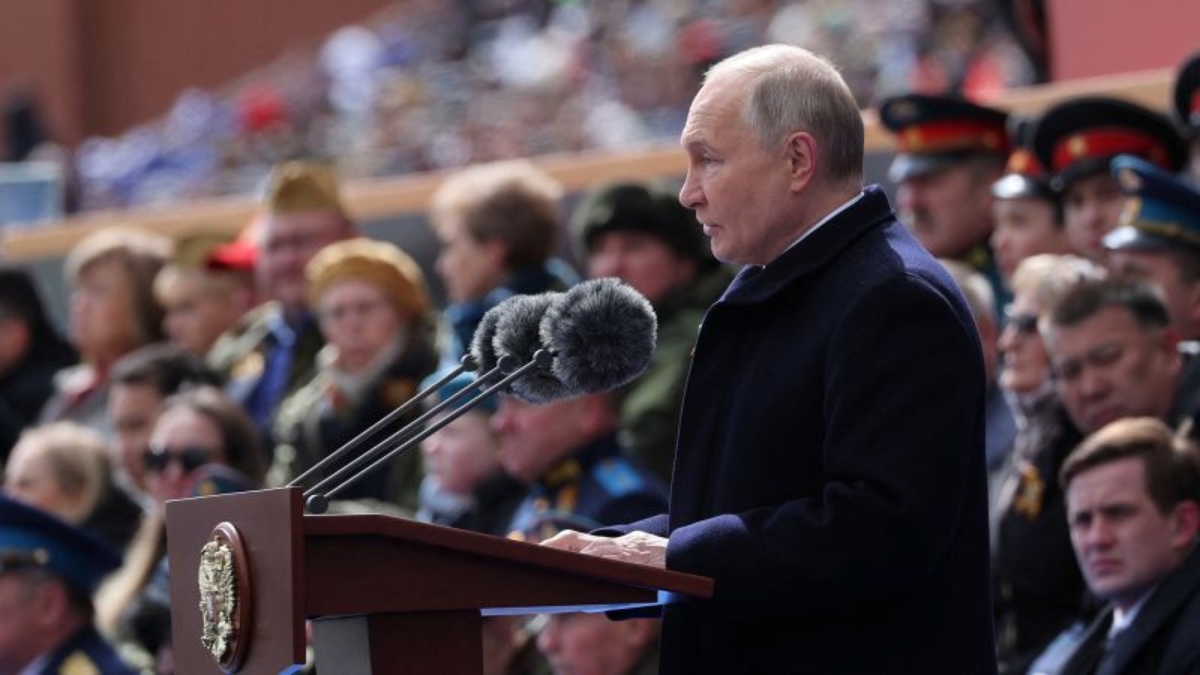(CNN) — The president of Russia, Vladimir Putin, presided over a reduced Victory Day parade this Thursday, in which he showed the unity of his country and its determination to continue the war against Ukraine. However, the martial celebrations also masked latent tensions within the Kremlin and Russian society.
At first glance, this year’s parade in Red Square was the usual well-choreographed display of military might: more than 9,000 military personnel participated, including a thousand currently serving in what Russia still calls the “special military operation,” the official euphemism for the full-scale invasion of Ukraine. The mechanized column was led by a World War II-era T-34 tank, a symbol of the Soviet victory over Nazi Germany in World War II.
May 9 is more than a day to commemorate the more than 25 million Soviet soldiers and civilians who died during World War II.
Under Putin, the Russian state has elevated the collective memory of the war to something resembling a secular religion. It is a day of great solemnity: in recent years, Russians have participated in “Immortal Regiment” marches, carrying photos of relatives who served in the war. Putin, who has made “patriotic education” a priority, traditionally lays flowers at the Tomb of the Unknown Soldier.
However, since Russia launched its full-scale invasion of Ukraine, the huge military parade has been scaled back somewhat. Last year, the usual flyover of military aircraft over Red Square was canceled, and this year’s parade only featured one tank, the T-34, a museum piece. First-line priorities seem to take precedence over ceremony.
And as in previous years, Putin presented the war in Ukraine on Thursday as a continuation of what Russians call the Great Patriotic War, making the mendacious claim that Russia is fighting “neo-Nazism” in Ukraine. And although the war in Ukraine appears to be going better for Russia than it was a year ago, Putin continues to call on Russians to make more sacrifices in wartime.
“Russia is now going through a difficult, transitional period,” he said in a speech before the parade.
“The fate of the country, its future, depends on each of us… We celebrate Victory Day in the context of the special military operation. All its participants — those who are at the front, on the line of contact fighters—are our heroes. We bow to your perseverance and selflessness, dedication. All of Russia is with you.”
However, this year’s Victory Day also comes against the backdrop of a bribery scandal rocking the Russian Defense Ministry.
Last month, Russia’s Deputy Defense Minister Timur Ivanov became embroiled in a corruption investigation, detained on suspicion of accepting a bribe of “an especially large size.” The scandal widened with the arrest of two Russian businessmen suspected of being involved in bribery.
Ivanov denied involvement in bribery and is willing to give detailed testimony to prove his innocence, according to the Russian state news agency TASS. And Defense Minister Sergei Shoigu, Ivanov’s boss before he was removed from his ministerial post, played his usual role at this year’s Victory Day parade, reviewing the troops and briefing Putin before the speech of the president.
Kremlinologists can draw few conclusions from Shoigu’s performance on May 9. But the detention of his protégé gave rise to speculation about infighting at the highest levels of power and launched an uncomfortable revelation about what observers consider a culture of rampant corruption within the Russian military.
As head of construction at Russia’s Defense Ministry, Ivanov was responsible for overseeing projects such as the reconstruction of the shattered Ukrainian port city of Mariupol, destroyed by Russian forces in 2022.
The reconstruction of apartment blocks in Mariupol has been a fixture of Russian government propaganda: Putin visited the occupied city last spring as part of a public relations campaign.
However, a visual investigation carried out by the Financial Times revealed that shoddy work was carried out in Mariupol, heightening speculation that reconstruction funds were diverted by Russian companies that obtained government construction contracts.
Ivanov is sanctioned by the United States and the European Union (EU) for his role in the war against Ukraine. But the lavish lifestyle of his former partner – who has a luxurious Parisian address and enjoys the ski slopes of Courchevel – was widely scrutinized by the Anti-Corruption Foundation (ACF), the investigative team founded by the Russian opposition leader Alexey Navalny, who died in a Russian prison north of the Arctic Circle earlier this year.
Russia’s political opposition — which under Putin’s regime has been largely marginalized or driven into exile — remains shocked by Navalny’s death.
However, Navalny’s research foundation has pressed ahead with its relentless exposure of corruption in Putin’s Russia.
In recent weeks, ACF senior researcher Maria Pevchikh has dominated much of the online Russia conversation with the launch of a documentary series titled “The Traitors,” which traces Putin’s origins against the background of the political and economic pitched battle in Russia in the 1990s. Corruption is the original sin of today’s Russia.
But that is not the message Putin projects on Victory Day.
Despite heavy losses in men and equipment on the Ukrainian battlefield, defense spending has boosted the Russian economy. Putin’s technocrats have skillfully managed the economy amid international sanctions, returning the country to GDP growth.
However, the Russian economy remains famously inefficient and corrupt. Prestige projects, such as the 2014 Sochi Olympics, have long been marred by accusations of corruption and favoritism, especially in the awarding of contracts. And the standard of living of ordinary Russians is a secondary consideration in Putin’s war economy.
From this point of view, this year’s Victory Day in Moscow was more of a feel-good exercise, presenting contemporary Russia as the opposite of the 1990s: proud, militarily strong, advancing inexorably. And Putin, after a quarter of a century in power, presided over the whole affair with the same rhetoric of patriotism, sacrifice and love for the motherland.
In Russia, continuity has a quality of its own.
